What I Wish I Knew Before Writing for Food Bloggers
When I first started writing for food bloggers, I had no idea what I was stepping into. Here’s what I wish I’d known before diving into this underestimated and fast-paced niche.
Five years ago, I didn’t even know that you could make money writing for food bloggers. Food Blog Ghostwriter? Never heard of it.
I always assumed that food bloggers put their recipes on the internet, wrote long stories about how their grandma loved the recipe, and then called it a day! Oh, how spectacularly wrong I was. 😅
If you're wondering how to become a food blog writer—or you're already working with them but feeling like you're missing something—here's what I wish someone had told me before I dove in.
My Unexpected Start in Food Blog Writing
I backed into this niche the way most writers do: accidentally.
I started as a virtual assistant and landed my first food blogger client through a VA Facebook group. The post was simple: "I’m hiring a ghostwriter for my food blog." I didn’t know what a "food blog ghostwriter" was, let alone a legitimate job title or a specialized skill set.
That first client opened my eyes to an entire industry I didn't know existed. Food bloggers weren't just sharing family recipes; they were running sophisticated content businesses with multiple revenue streams, brand partnerships, and audiences in the hundreds of thousands.
The learning curve was steep. I remember Googling, “What do food bloggers write about in their blog posts?” A lot of those articles mentioned SEO (search engine optimization), which I also had no clue about. I certainly didn't grasp the business systems required to work effectively in this niche.
What I Wish I Knew Before I Started Writing for Food Bloggers
These lessons would have saved me months of trial and error and probably a few client relationships along the way:
1. You’re Not Just a Writer - You’re a Collaborator
I once delivered beautiful copy about "silky pasta and aromatic garlic" when the client needed content optimized for "easy weeknight dinners" with strategic affiliate links. My gorgeous prose was useless without the strategic foundation.
Food blog writing isn't about pretty words - it's about understanding your client's business goals, target keywords, and monetization strategy. You're not just a writer - you’re a strategic partner.
2. Food Blogging Is a Business (and You Should Treat It Like One Too)
Early on, I treated freelance writing for food bloggers like a casual side hustle. A client would text recipe ideas at 9 PM, I'd work without contracts, and I blurred professional lines. This approach cost me a high-paying client when scope creep led to missed deadlines.
Food bloggers are entrepreneurs managing SEO, Pinterest marketing, brand partnerships, affiliate income, and email lists. You need professional systems from day one: contracts, project management tools, and clear boundaries.
3. SEO Is Non-Negotiable
One of my first months, I wrote about "delicious homemade bread." The client explained that no one searches for "delicious bread" - they search for "easy bread recipe." My beautiful writing was invisible to her audience.
In food blogging, SEO drives the traffic that supports the entire business model. You need to understand keyword research, featured snippet optimization, internal linking, and recipe schema markup.
4. Staying Ahead of Industry Trends is Crucial
Food blogging moves fast. Algorithm changes, new platforms, shifting consumer preferences - what worked six months ago might be dead weight today.
Stay plugged into Google updates, Pinterest strategy changes, emerging food trends, and new monetization opportunities. Your clients count on you for strategic insights, not just execution.
5. Voice and Tone Matter More Than You Think
I once spent hours crafting what I thought was perfect copy, only to hear: "This sounds like a cooking magazine. My readers want advice from their best friend."
Every food blogger has a distinct voice that their audience expects. Study their popular posts, read comments, and pay attention to what drives engagement. The voice that works is the voice that converts.
6. You Don’t Need to Be a Trained Chef
What matters more than culinary expertise:
Understanding how people search for recipes
Writing clear, scannable instructions
Grasping recipe psychology and sharing behavior
Strong research skills for trending ingredients
Food bloggers need you to make their content discoverable and profitable, not validate their recipes.
7. Clear Communication Makes or Breaks Projects
Food blog projects get complex quickly: recipe posts, roundups, brand content, seasonal campaigns. Each requires different approaches and success metrics.
Set upfront clarity about content goals, SEO requirements, brand voice expectations, revision processes, and payment terms. Being flexible while maintaining boundaries isn't contradictory - it's essential.
How the Food Blog Writing Niche Changed My Career
Working in this niche taught me that specialized expertise commands premium rates. Once I understood the unique requirements of writing for food bloggers—the SEO considerations, the business models, the audience expectations—I could charge significantly more than I did as a generalist writer or virtual assistant.
The relationships tend to be longer-term, too. Food bloggers need consistent content to maintain their search rankings and audience engagement. When you prove you understand their business and can deliver results, they want to keep working with you.
There's also something satisfying about working in a niche where you can see direct results. When a recipe post you wrote ranks #1 for a competitive keyword, or when your content helps a client land a major brand partnership, the impact is tangible.
If You’re Thinking About Writing for Food Bloggers…
This niche needs writers who understand that food blogging is serious business disguised as sharing family recipes. If you can combine strong writing skills with strategic thinking and SEO knowledge, you'll find plenty of opportunities.
Here are my top tips for freelance food writers getting started:
Learning the basics of SEO for content creators
Studying successful food blogs to understand their content strategy
Getting familiar with how food bloggers monetize their content
Setting up strategic systems specific to food blog ghostwriting
Learning the process for creating effective food blog content
The demand is real. Food bloggers are actively looking for writers who can help them scale their content without sacrificing quality or strategic focus.
Want Support on This Journey?
That's exactly why I started the Mastermind for Food Blog Writers. Working in this niche has unique challenges and opportunities that general writing communities don't always address.
The Mastermind provides:
Strategic guidance on pricing and positioning in the food blog space
SEO training specific to recipe content and food blogging
Community support from other writers working in this niche
Regular industry updates and trend analysis
Direct access to networking opportunities with established food bloggers
If you're already writing for food bloggers or seriously considering it, learn more about joining the community.
The Bottom Line
Writing for food bloggers isn't just about having a way with words - it's about understanding a complex content business and knowing how to support its growth through strategic writing.
You don't have to figure it out alone. The learning curve is real, but so are the opportunities for writers who approach this niche with the right mindset and skills.
Whether you're just starting to explore food blog writing or looking to level up your existing client relationships, remember that your role goes far beyond crafting beautiful descriptions of chocolate chip cookies. You're helping build businesses, one strategically optimized blog post at a time.
Ready to dive deeper? Share this post with a fellow writer who might be curious about this niche, leave a comment with your biggest question about food blog writing, or DM me - I love talking shop about this industry.
For more insights on breaking into this niche, check out my guides on becoming a food blog ghostwriter and my proven process for writing food blog posts. And if you're serious about building a career in content writing, learn more about the Mastermind community where food blog writers connect, collaborate, and grow together.





